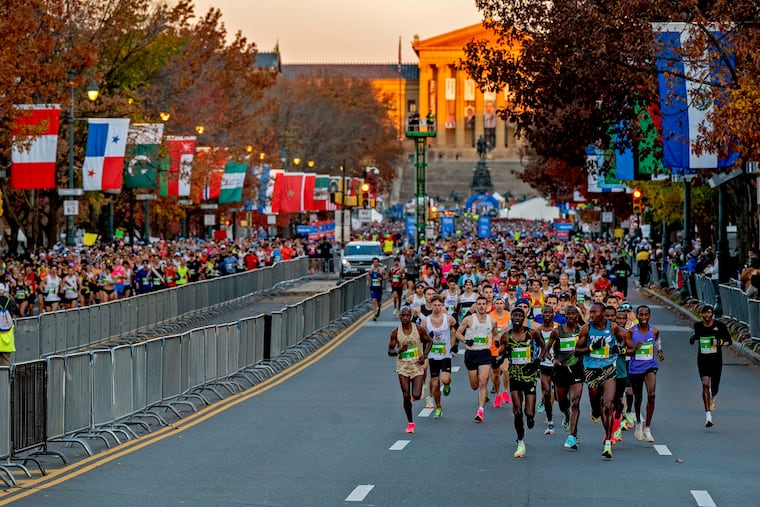Nonbinary Philadelphia Marathon runners can now compete for non-elite open division awards
The City of Philadelphia and Philadelphia Marathon organizers say the new policy will give more nonbinary non-elite athletes the opportunity to win. The policy for elite runners remains unchanged.

Despite concerns raised by local athletes and LGBTQ advocates, the Philadelphia Marathon will continue to follow national governing body guidelines that exclude nonbinary participants from elite runner awards.
However, organizers have announced new prize opportunities for non-elite runners in all gender divisions.
In 2023, critics expressed frustration that while cash prizes were available to nonbinary runners in some non-elite categories, elite runners were required to compete in the men’s or women’s division to be eligible for awards.
On Thursday, the City of Philadelphia and Philadelphia Marathon Weekend organizers revealed that prize money will now be awarded to non-elite runners placing first, second, and third place for all gendered divisions in the 2024 Philadelphia Marathon, which is the weekend of Nov. 22 to 24.
Previously, only the “first Philadelphian” (the first runner from the city) and the “first Masters” (the first runner over 40 years old) were awarded prize money across genders. The new policy will allow all non-elite runners, including nonbinary participants, to sign up as their authentic selves and compete for prize money as top finishers in the full marathon, half marathon, and 8K races.
“We’ve had nonbinary categories in all of our races since 2022. This year we wanted to create a space within our races where [non-elite] runners who identify as nonbinary can compete for prize money,” said Kathleen Titus, Philadelphia Marathon Weekend Race Director, in a statement.
Organizers are also implementing a “face-value approach” to monitoring all gender categories, allowing runners to select their gender identity without additional documentation. In previous years, open division runners did not have to provide evidence as no prizes were awarded. Elite-level runners, however, must still provide supporting evidence such as ID verification and drug testing for testosterone and hormone levels, in line with USA Track & Field guidelines.
“The face-value approach to monitoring is crucial in ensuring equity within this space,” said Celena Morrison-McLean, executive director at the Office of LGBT Affairs, in a statement.
However, the policy for elite runners remains unchanged.
The marathon will continue to follow USATF guidelines, which does not recognize a separate division for elite nonbinary runners.
Elite participants, who are at the top of their field, receive free registration, prime starting positions, and may be eligible for complimentary travel, hotel accommodations, and larger prize purses. Runners qualify as elite by meeting standard times set for their division in previous races. Prize money for elite runners can reach several thousand dollars.
Last year, 102 athletes registered as nonbinary across all four races. Currently, 120 nonbinary runners have registered for the 2024 races.
Amanda Gamble, chief of staff for general services for the city and spokesperson on the new marathon policy, said they said they aimed to make an impact within their jurisdiction.
“We wanted to make an impact for everyday local and nonprofessional runners” so that more nonbinary runners had the opportunity to win cash awards, Gamble explained.
“We really have been trying to be intentional about having conversations with other races and community advocates,” she said. “We hope this is a step in the right direction.”